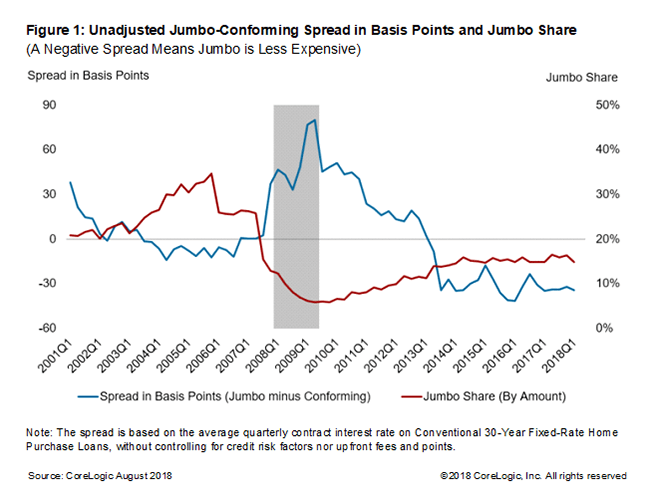Navigating the Jumbo Loan Process: Expert Tips for Securing Your Desire Home
Navigating the Jumbo Loan Process: Expert Tips for Securing Your Desire Home
Blog Article
Discovering the Advantages and Features of Jumbo Loans for Your Next Home Purchase Decision
As the property market progresses, understanding the details of jumbo financings ends up being significantly significant for possible homebuyers thinking about high-value homes. These finances not just help with substantial funding but additionally provide numerous benefits, such as affordable rate of interest prices and the prospective elimination of exclusive mortgage insurance. The course to securing a big car loan is filled with particular eligibility standards that may test some customers. To fully appreciate exactly how jumbo fundings can influence your home purchase strategy, it is important to explore their key features and advantages in higher information.
What Is a Jumbo Lending?

Jumbo loans are typically used by customers seeking to acquire high-value residential properties or homes in pricey markets. jumbo loan. Provided the larger amounts obtained, lending institutions typically impose more stringent credit demands, including higher credit report, lower debt-to-income proportions, and larger deposits. The rate of interest prices on big lendings might be slightly greater than those on adapting fundings, mirroring the increased threat for loan providers
Additionally, the approval procedure for a big finance can be more time-consuming and intricate, as loan providers require substantial documentation to evaluate the consumer's economic stability. Comprehending these nuances is important for prospective property owners taking into consideration a big lending for their property funding demands.
Trick Benefits of Jumbo Fundings
One substantial advantage of big financings is their capacity to fund higher-priced residential or commercial properties that go beyond adhering funding restrictions. This attribute makes them an attractive alternative for buyers wanting to purchase luxury homes or residential or commercial properties in high-cost locations where rates generally surpass standard financing thresholds.
Additionally, big fundings typically include adaptable terms and competitive passion rates, enabling customers to tailor their financing to match their distinct financial scenarios. jumbo loan. This versatility can consist of choices for variable-rate mortgages (ARMs) or fixed-rate finances, providing buyers with the capability to manage their monthly repayments according to their preferences
One more benefit is that jumbo fundings do not need private mortgage insurance coverage (PMI), which can significantly lower the overall cost of the lending. With PMI usually being a significant expense for standard loans with low down settlements, preventing it can result in substantial financial savings with time.
Moreover, borrowers of big loans normally have access to greater car loan quantities, enabling them to buy buildings that fulfill their way of life requires. This access encourages purchasers to act decisively in competitive actual estate markets, securing their desired homes better. Generally, big car loans use essential benefits for those seeking to finance costs residential or commercial properties.
Qualification Demands for Jumbo Financings
Jumbo lendings come with specific qualification needs that potential borrowers should satisfy to safeguard funding for high-value buildings. Unlike conventional fundings, which have actually set limitations based on the adapting car loan limitations developed by government-sponsored entities, jumbo finances go beyond these thresholds, requiring more stringent standards.

Moreover, big car loans usually demand a considerable down repayment, frequently varying from 10% to 20% of the acquisition cost, depending on the lending institution's plans and the borrower's financial scenario. Fulfilling these qualification demands can position customers favorably in securing a jumbo car loan for their preferred home.
Comparing Jumbo Loans to Traditional Fundings
Comprehending the distinctions in between big finances and standard finances is important for homebuyers navigating the premium realty market. Jumbo finances surpass the adjusting financing limits set by the Federal Housing Finance Agency (FHFA), which indicates they are not eligible for acquisition by Fannie Mae or Freddie Mac. This causes different underwriting criteria and needs for customers.
On the other hand, traditional fundings generally adhere to these restrictions, enabling for a much more streamlined authorization procedure. Big lendings commonly require more stringent credit history, bigger deposits, and greater monetary books. While a standard car loan may need a down payment of as little as 3% to 5%, jumbo finances typically necessitate a minimum of 10% to 20%.
Rates of interest on big fundings might vary from those of standard finances, often being somewhat higher due to the enhanced risk lending institutions assume - jumbo loan. Nevertheless, the possibility for significant financing can be beneficial for buyers seeking high-end residential properties. Inevitably, recognizing these differences allows buyers to make informed decisions, aligning their financing options with their special buying requirements and economic circumstances
Tips for Securing a Jumbo Loan
Safeguarding a jumbo funding needs careful preparation and preparation, as loan providers commonly impose stricter needs compared to traditional lendings. To enhance your possibilities of approval, begin by examining your credit rating and attending to any issues. A rating of 700 or greater is usually favored, as it demonstrates creditworthiness.
Next, gather your financial paperwork, consisting of tax obligation returns, W-2s, and financial institution statements. Lenders generally call for extensive evidence of earnings and assets to analyze your capacity to pay back the check my source finance. Keeping a reduced debt-to-income (DTI) ratio is additionally crucial; purpose for a DTI below 43% Go Here to enhance your application's competition.
In addition, consider making a larger down settlement. Numerous lending institutions look for at least 20% down for jumbo lendings, which not just decreases your lending quantity however additionally signals monetary security. Engaging with an experienced home loan broker can offer vital insights right into the procedure and aid you navigate different loan provider options.

Conclusion
In summary, big finances existing substantial advantages for homebuyers seeking homes that go beyond standard lending limitations. Thorough understanding of both the benefits and demands connected with big car loans is important for making informed home purchase decisions in an affordable genuine estate market.
The rate of interest rates on big financings may be slightly greater than those visit site on adjusting loans, reflecting the raised threat for lenders.
While a traditional finance might call for a down settlement of as little as 3% to 5%, jumbo loans generally require a minimum of 10% to 20%.
Interest rates on big fundings might vary from those of conventional lendings, frequently being slightly greater due to the enhanced risk lenders presume.Securing a jumbo financing requires cautious planning and prep work, as lending institutions usually enforce stricter demands compared to standard loans. Lots of loan providers seek at least 20% down for jumbo lendings, which not just minimizes your loan amount yet additionally signals economic stability.
Report this page